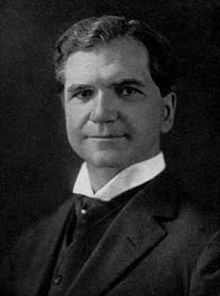Ralph Waldo Trine
Appearance

Ralph Waldo Trine (October 26, 1866 – November 8, 1958) was an American philosopher, author, and teacher. He wrote many books on the New Thought movement.
Quotes
[edit]Every Living Creature (1899)
[edit]- Every Living Creature: Or, Heart-training Through the Animal World, New York: Thomas Y. Crowell & Co., 1899. Full text online at the Internet Archive.
- The tender and humane passion in the human heart is too precious a quality to allow it to be hardened or effaced by practices such as we so often indulge in.
- epigraph, from title-page
- How important it is, then, that the child be taught to govern its passions! How important that it be taught to be kind, gentle, loving, and humane; and in all the range of human thought there is not a better, wiser, or more expedient way of accomplishing this end than by teaching kindness towards God's lower creatures. If children are thus taught they will have instilled into their hearts those principles of action which will make them kind and merciful not only to the lower animals, but also toward their fellow-men as they attain to manhood. Let them be taught that the lower animals are God's creatures, as they themselves are, put here by a common Heavenly Father, each for its own special purpose, and that they have the same right to life and protection. Let them be taught that principle recognised by all noble-hearted men, that it is only a depraved, debased, and cowardly nature that will injure an inferior, defenceless creature, simply because it is in its power to do so, and that there is no better, no grander test of true bravery and nobility of character than one's treatment of the lower animals.
- pp. 6-7
- The child who has been taught to realise the claims that God's lower creatures have upon him, whose heart has been touched by lessons of kindness and mercy, under their sweet influence will grow to be a large-hearted, tender-hearted, manly man. Then let the children be trained, their hands, their intellects, and above all their hearts. Let them be taught to have pity for the animals that are at our mercy, that cannot protect themselves, that cannot explain their weakness, their pain, or their suffering, and soon this will bring to their recognition that higher law, the moral obligation of man as a superior being to protect and care for the weak and defenceless. Nor will it stop here, for this in turn will lead them to that highest law—man's duty to man.
- p. 8
- After looking carefully into the matter, and after some years' experience in its non-use, I can state without hesitancy that, contrary to the prevailing opinion, the flesh of animals is not necessary as an article of food. … We shall find numerous articles of food, as we study the matter, that, so far as body nourishing, building, and sustaining qualities are concerned, contain twice, and in some cases over twice, as much as any flesh food that can be mentioned.
- pp. 25-26
- The only really consistent humanitarian is the one who is not a flesh-eater; and great, I am satisfied, will be the results, both to the human family and to the animal race, as children are wisely taught and judiciously directed along this line.
- p. 30
- The time will come in the world's history, and a movement is setting in that direction even now, when it will be deemed as strange a thing to find a man or a woman who eats flesh as food, as it is now to find a man or a woman who refrains from eating it. And personally, I share the belief with many others, that the highest mental, physical, and spiritual excellence will come to a person only when, among other things, he refrains from a flesh and blood diet.
- p. 34
- When we study the habits of animals in a truly sympathetic way and become thoroughly acquainted with them and with the work that each one is performing, we shall see that each one has its place in the economy of God's world, that each has its part to play, and that even so far as the animal world is concerned we are all related and inter-related. If we destroy or permit to be destroyed that marvellous balance which the Divine Power has instituted in the Universe, we do it at our own peril. Instead, then, of being the enemies of the animal world, instead of being its persecutors and its destroyers, we should be its friends and helpers.
- p. 64

